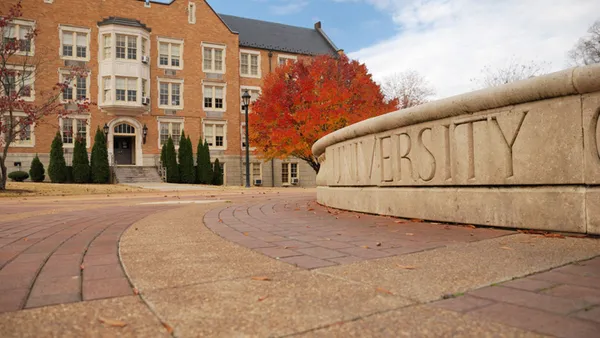Dive Brief:
-
A coalition of advocacy groups and think tanks is pushing a series of consumer protections aiming to help students understand the price of college and get what they paid for.
-
The Tuition Payer Bill of Rights makes six demands, including that colleges refund students for services they don't receive and allow them to opt out of paying for "non-essential services."
-
The demands come as students across the nation sue colleges for tuition refunds, arguing that the remote education they've received isn't worth the price.
Dive Insight:
James Toscano, president of the Partners for College Affordability and Public Trust, contends that the outcry for housing and tuition refunds amid the pandemic highlights the need for more consumer protections in higher education.
"This is now a kitchen-table issue in America," he said. "Students and families in every neighborhood, in every community, almost no matter the income, are having these discussions about how to ensure they get what they're paying for."
His organization, which advocates for more transparency in higher ed costs, is championing the bill of rights. At least nine other groups have also signed onto it.
The initiative urges institutions to:
-
Refund students for tuition, fees and room and board costs if they don't receive those services;
-
Allow them to opt out of paying for nonessential services, which includes athletics and recreation fees;
-
Provide free online class materials to students;
-
Estimate how much students should anticipate to spend on their education and say how their tuition dollars are used;
-
Inform students of the expected earnings a degree offers;
-
Allow students to address college governing boards during open board meetings before they make decisions.
Some of the proposed rights echo recent legislative proposals. Last year, federal lawmakers introduced a handful of bills meant to make it easier for families to compare the cost of education across multiple institutions and help them better understand financial aid offer letters and loan options. The U.S. Department of Education last year added program-level data to the College Scorecard, an online tool that helps families compare costs, borrowing rates and outcomes across institutions.
However, the bill of rights isn't aiming to catch lawmakers' attention, Toscano said. "Our goal is institutional change led by innovators in our industry who agree that students need consumer protections."
Many schools refunded students' housing costs after the pandemic forced them to mostly clear most students out of their dorm rooms last spring. But students have also been petitioning and suing their institutions for tuition refunds, arguing that the virtual education they've received is inferior to the in-person instruction they expected.
Education law experts are doubtful most of these lawsuits will succeed. For one, judges "are reluctant to assess the quality or value of education," Mark Moore, a partner at law firm Reavis Page Jump, wrote in an email. And courts may dismiss some of these cases if they determine the students suing aren't in similar enough situations to be granted class-action status.
However, if a school inserted language similar to the bill of rights into its enrollment contracts, it could be enforceable, Moore wrote. "It is more likely," Moore added, "that should a college adopt a provision like this, the adoption is likely to be accompanied by a statement that the university is accepting a goal which it hopes to achieve, leaving the college some room for backing out."














